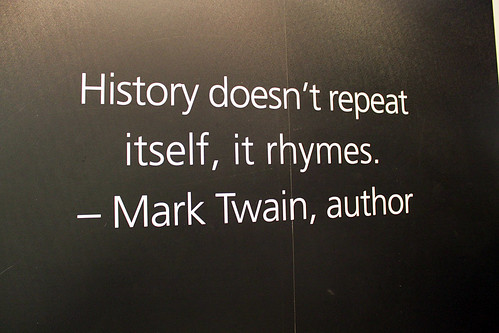The Great Bubble of the 80s marked the death of Japan as the place of the rising son. More than twenty years have passed, and my home country has been back on track with full-speed production…of zombies: dead companies that do not innovate, withdrawals living off their parents’ assets, second-generation politicians who care nothing but increasing their retirement fund.
I have been taught all along by the “experts” that the real estate bubble was the source of all evil. “If only the government were able to control it,” those economists would whine endlessly. I accepted the theory but it never sank in. The reason was simple—nobody I knew of lost their wealth due to the collapse of the housing market. I knew more people, including myself, who benefited from it: lower prices, increased deregulation, liberation of mass media, so on.
But of course the declining economy has been a reality, because job prospects were (and are) disappearing steadily. What did not feel was the reasoning. Then over the years, I found something that finally made sense: population. The renowned economist Paul Krugman touched this subject in his blog post:
The real Japan issue is that a lot of its slow growth has to do with demography. According to OECD numbers, in 1990 there were 86 million Japanese between the ages of 15 and 64; by 2007, that was down to 83 million. Meanwhile, the US working-age population rose from 164 million to 202 million.
I know the shrinking population is real. My father has four siblings. My mother has six. I have two siblings (my younger brother and younger sister). I have no offspring (yet). The trend is clear, as visualized in this graph: From 1992 and onward, Japan’s working population has been declining continuously toward abyss. That somehow matches Japan’s economic status, and I don’t think it is a coincidence.
They say the technological advance—automation, large-scale production facilities, systematization of management—can be the other engine of the “dual core” of economic growth. That’s what ageing countries, namely China, seem to be focusing in order to grow without counting on unlimited supply of cheap labor. Alas, according to Wikipedia, population growth takes much larger role than we think, even in the most prominent example of technological advance that pulled the mass of poverty: industrial revolution.
Economic growth can also be of interest without reference to per capita changes in standard of living. An example of this is the economic growth in England during the Industrial Revolution. Certainly, per capita increases in productivity occurred due to the replacement of hand labour by machines. However, economic growth during this period was in large part so dramatic because England’s population simultaneously increased very rapidly (1700 A.D. – 1860 A.D.). The two factors together, more production per worker combined with many more workers, resulted in a sixfold increase in production between 1700 and 1860. Population growth alone accounted for most of this increase.
Then recently I came across this analysis about the current and future economic situation of China. Long story short, here is the conclusion: History repeats itself. How so? This graph from the article shows it all. The demography of China closely resembles that of Japan. And of course there is a housing bubble going on. 1 + 1 is always 2.

Taiwan, where I live, is not immune either. Taiwan’s birthrate is already one of the lowest in the world. I recently discussed the local housing market with my colleagues. A second-hand 2LDK apartment costs around US $500,000 at central Taipei. The average monthly salary of a 30-year old Taiwanese worker is US $1,000. If he spend one third of his salary for mortgage payment, he needs to pay more than a hundred years (and that’s not counting the interest). If this isn’t a real estate bubble, what is it?
Maybe the real estate bubble is not the cause but the preceding indicator of what comes next: long-term economic decline caused by population decline. People say you can’t compare Japan with the rest of Asia (with a tint of political correctness). But since all economic activities follow the rule of capitalism, hoping a different future is equal to repeating the same thing and expecting a different result: a sign of lunacy.











